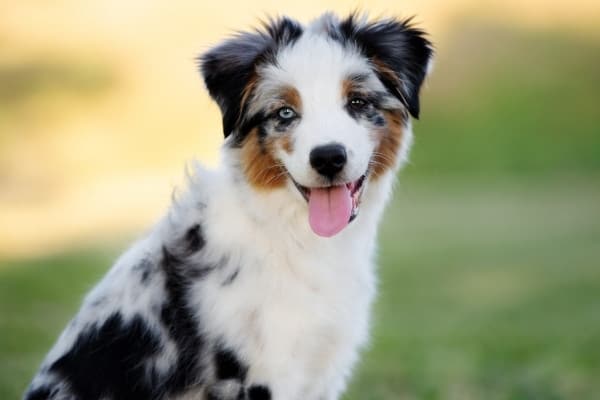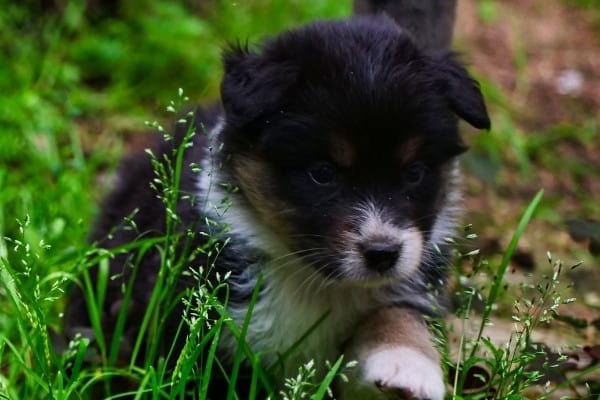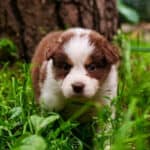
Miniature Australian Shepherds are considered small-to-medium dogs. Some are much smaller at around 20 pounds or so, while others can grow to around 60 pounds. Do you want to know more about mini Aussie growth and developmental stages?
Most Australian Shepherds reach adulthood by 16 months, but if you have a Mini Aussie, expect your pooch to be full grown by 12 months of age. In some cases, Mini Aussies will reach their full height at 9 months old but continue to gain weight until they are a year and a half old.
Are you new to the breed and want to be sure your puppy is growing normally?
We’ve broken down everything a Mini Aussie owner can expect in terms of growth and development, so let’s get started.
Mini Aussie Growth
With a growth chart, it’s easier to keep track of whether your Mini Aussie is staying within the expected weight range or not. Track your mini Aussie growth using this chart.
Mini Australian Shepherd Growth Chart
| Age | Weight |
| Birth | 0.5 lbs. |
| 4 Weeks | 3 lbs. |
| 8 Weeks | 7 lbs. |
| 3 Months | 12 lbs. |
| 4 Months | 14 lbs. |
| 5 Months | 17 lbs. |
| 6 Months | 19 lbs. |
| 7 Months | 21 lbs. |
| 8 Months | 22 lbs. |
| 9 Months | 23 lbs. |
| 10 Months | 24 lbs. |
| 11 Months | 25 lbs. |
| 12 Months | 27 lbs. |
Birth to 8 Weeks
Expect Mini Aussies to come out very small when they are born at just around half a pound at birth.
Over the next couple of weeks, they may gain a little over two pounds. They are very reliant on their mothers during this time.
Months 2-4
At this stage, you will notice mini Aussie growth in leaps and bounds!
They will start gaining considerable weight from being off their mother’s milk and onto their puppy kibble, although their appetite might not be enormous just yet.
Months 4-6
At four months, they usually reach half of their adult height and weight and will continue their rapid growth until they attain two-thirds of their mini Aussie growth by the 6-month mark.
Months 6-9
Their weight will vary widely at six months, but they usually reach their adult height by then. So, you should already have a decent idea of how big an adult Mini Aussie will be at this time.
Months 9-12
Once they hit nine months, Mini Aussies are usually done growing.
You might still see some weight gain up until their first birthday but not very much. It’s unlikely that they will gain more height by this point.
Months 12-18
A Mini Aussie is considered physically an adult now, but while their bodies may be done growing, they will continue to develop mentally.
It’s not uncommon for them to still act like a puppy at this age.
Mini Aussie Stages of Development

For more specific growth stages and milestones, check out the following chart.
Keep in mind that not every puppy matures at the same rate, so there is usually no need for concern if your pup is slightly ahead or behind the norm.
Mini Aussie Stages of Development
| Stage | Milestones | Expected Problem Behaviors |
| Newborn (0-2 weeks) | Eyes & ears open | Risk for infections, digestive issues |
| Transition (2-4 weeks) | Start to develop motor skills, transitions from crawling to walking | Biting |
| Exploration (4-8 weeks) | Can be separated from mother briefly, ready to start housetraining | Playfighting, housebreaking mistakes |
| Fear Period (8-10 weeks) | Sleeps through the night, better bladder control | Fearful over everyday objects, noises, and experiences |
| Socialization (10-12 weeks) | Trainable | Hyperactivity, disobedience |
| Juvenile (3-6 months) | Adolescent period starts, confidence increases | Flight instinct period |
| Adolescence (6-18 months) | Full mental maturity | Second fear stage |
| Adult | Puppy behaviors disappear | Destructive behavior when not trained well |
Birth to 4 Weeks
Newborn puppies won’t be able to regulate their body temperature, so they need to be kept warm.
They will spend the first couple of weeks after birth sleeping 90 percent of the time and will be more often awake at around two weeks of age.
Then they will start moving their heads from side to side and begin to develop their motor skills.
Their teeth begin growing around 20 days, and they quickly start showing signs of wanting to play with their littermates.
They will also start eating food at this stage, and their mothers will begin teaching them to nurse more gently and when to stop. They will experience their first lessons of discipline.
Weeks 4-12
By this time, puppies will begin eating well, and mothers will be well into weaning their puppies.
At this age, puppies will be more aware and eager to explore their surroundings, climb and chew on things, or tug on their littermates, but they still have short attention spans.
They can start house training at two months and can begin exercising at three months.
It’s important to keep up with their socialization at this stage so that they become confident, trust-worthy adults.
Keeping a good variety of chew toys accessible is highly recommended during this stage and the coming months.
I used this variety pack when my dogs were little and had very few issues with destructive chewing.
The ropes and treat ball were favorites, and the texture of the toys were just right for puppy mouths.
No products found.
Pre-Adolescence
Mini Aussie puppies become more independent and start to test dominance and leadership during this period. Your once compliant Mini Aussie can become more hyperactive and disobedient.
They will test their boundaries at this time, so it is critical to be consistent with training and correct the dog when necessary.
At around 9-10 months, they will reach sexual maturity and can already transition to adult food.
Adolescence
Once mini Aussie growth stops at adulthood, they need continuous challenge and stimulation.
Otherwise, they can turn their energy into more destructive behaviors like excessive chewing. They need lots of exercise and proper training.
Mini Aussies usually reach full mental maturity at around 15 months of age, but in rare cases, they can retain their puppylike behavior into adulthood.
Related Questions:
When Do Mini Australian Shepherds Lose Their Puppy Coat?
Mini Aussies will start losing their fluffy puppy coat and grow into their adult coats between the ages of six to eight months.
Do Mini Australian Shepherds Change Color?
A Mini Aussie’s coat can change in color and texture as it transitions from the puppy coat to an adult coat, but the change is usually not extreme.
More frequently, any change to coat color is due to excessive sun exposure.
Conclusion
Like all smaller dog breeds, Mini Aussies grow the fastest within the first six months.
After that, their growth will be more gradual until it plateaus at their mature height and weight at around their first birthday, sometimes earlier.
Last update on 2024-04-23 at 23:48 / Affiliate links / Images from Amazon Product Advertising API




